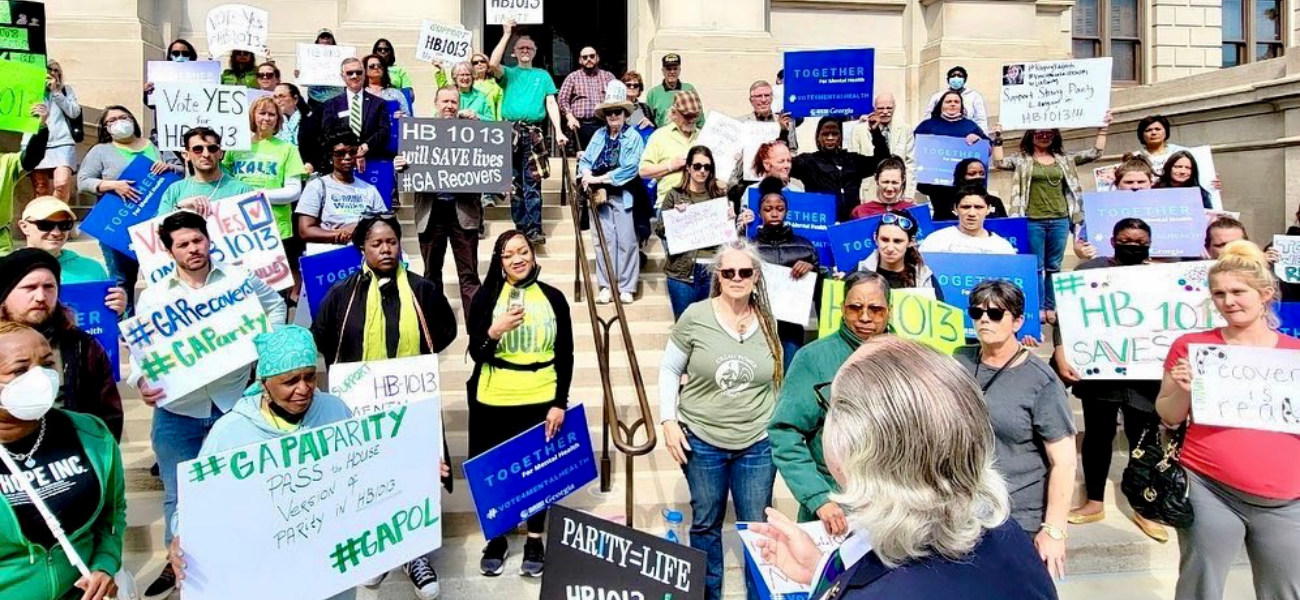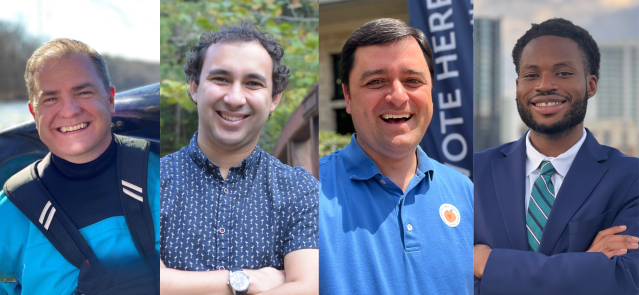Stay ahead of the curve as a political insider with deep policy analysis, daily briefings and policy-shaping tools.
Request a DemoWhat’s next for mental health in Georgia after key bill’s passage?

Credit: Jeff Breedlove
- 1 in 6 Georgians have mental-health needs while the state ranks 48th in access to care.
- Newly passed mental-health legislation seeks expanding care access and keeping more people in crisis out of jail and emergency rooms.
- Questions remain on how much state funding key mental-health programs will receive.
The Gist
State lawmakers moved not only to expand mental-health care coverage for hundreds of thousands of Georgians who struggle with accessing it, but also to keep people with severe conditions from winding up in jail or the emergency room instead of local treatment centers.
What’s Happening
The Mental Health Parity Act, sponsored by Georgia House Speaker David Ralston, R-Blue Ridge, proposes requiring Georgia’s insurance providers to guarantee coverage for mental health needs – a move patients and advocates say would help lift Georgia from the bottom ranks of states offering mental-health care access.
“It’s not just affecting one individual,” said Corinne Cherry, a Fulton County resident struggling with mental health and substance abuse issues. “It’s affecting everyone as human beings.”
“Now is the time for us to have parity and for us to have these services. I see people in my community that need this, now more than ever,” added Hank Arnold, a Coweta County resident recovering from substance abuse.
Ralston’s bill and related legislation also aim to bolster programs focused on keeping people with mental health issues out of jails and hospitals, such as “co-response” teams that send trained clinicians out with police officers to assess what to do with people experiencing psychotic episodes.
The bill passed both chambers of the General Assembly Wednesday and now heads to Gov. Brian Kemp’s desk for his signature.

LaGrange Police Chief Louis Dekmar stressed the need for more non-law enforcement help to address mental-health calls. He noted one person with a mental condition in LaGrange who’s been the subject of 176 calls and arrested 31 times over the past decade – a situation Dekmar says is costly and ineffective.
“The largest mental-health facility in each county is the county jail,” Dekmar told State Affairs. “We should not be in the mental-health business.”
Why It Matters
Georgia ranks 48th among all states in residents’ ability to access timely and effective mental health services and have insurance coverage for treatment, according to the nonprofit group Mental Health America (MHA).
The Peach State also ranks 50th in the number of adults with mental health needs who do not receive treatment, as well as 47th in the number of children with depression who don’t receive care, MHA’s findings show.
More than 1 in 6 adults had a mental health condition in Georgia in 2021, including around 336,000 who face serious mental illnesses such as bipolar disorder, severe anxiety or schizophrenia, according to State Affairs’ analysis of data from National Alliance on Mental Illness’ (NAMI) Georgia chapter.

Additionally, more than 44% of Georgia adults reported symptoms of anxiety or depression in February 2021, up about 10% from when the COVID-19 pandemic started in March 2020, according to data from the nonprofit Kaiser Family Foundation (KFF). And 104,000 of the state’s children aged 12 to 17 also suffered from depression in early 2021, according to NAMI data.
As of December 2021, roughly one-third of Georgia adults who need professional mental-health care reported not receiving it, largely due to high costs, NAMI and KFF report.
Nearly half of Georgia’s 159 counties don’t have a full-time psychiatrist, and in counties where there is a psychiatrist, only 53% accept Medicaid, making it tough for many low-income residents to secure mental-health treatment, according to recent findings from the state Behavioral Health Reform and Innovation Commission.
Advocates agree the lack of care access for people with mental health issues drives up costs far beyond what it takes to treat their conditions through larger jail populations, burdening hospitals and lost productivity at work.
“We have a system that people agree is dangerously broken,” said Jeff Breedlove, spokesman for the nonprofit Georgia Council on Substance Abuse.
The Money Question
Last December, state officials tallied up around $51 million likely needed to bolster several mental-health programs in the bill, including more than $28 million to spread co-response teams across the state, which send out mental-health workers on calls with police, according to a report from the state Office of Health Strategy and Coordination.
State lawmakers have offered up around half that amount so far, proposing between $22 million and $26 million amid negotiations that kicked off this week between top House and Senate lawmakers over next year’s $30 billion budget.

Lawmakers are also poised to budget between $3.2 million and $2.2 million for court-ordered involuntary treatment programs – less than the roughly $9.2 million to $11.4 million state fiscal analysts estimated would be needed to start bolstering those programs.
Some $18 million of the amount proposed by lawmakers in this latest bill are for “value-based payments” to local mental-health groups, with few details as to how that funding would be distributed. Both chambers’ lawmakers have proposed less than $1 million for co-response teams.
With less than a week left in this year’s legislative session, budget-writing lawmakers have only settled on approving $10 million to fund cancellable student loans for primary-care physicians and behavioral-health specialists who stay in Georgia and practice in underserved areas.
What’s Next?
Whatever happens this week, lawmakers expect to continue pumping more money into mental health in the years to come based on the blueprint from Ralston’s bill, said the speaker’s communications director, Kaleb McMichen.
“As for future funding, Speaker Ralston and the House have committed to addressing mental health care access and quality over the course of several years,” McMichen said. “We expect this issue will be part of the policy and budget discussions in 2023 and on into the future.”
It’s a sigh of relief for Breedlove, of the substance-abuse council, said other local advocates.
“We are operating with trust and confidence that they have been crunching the numbers for this,” Breedlove told State Affairs. “And we believe they have,” he said, adding that mental health advocates are confident funding will happen this year or next.

Kevin Tanner, the county manager for Forsyth County who heads the mental-health reform commission, also said he expects money to keep rolling in for mental health down the road.
“I’m very confident that we’re going to see the funding continue and that we’re going to see good decisions made,” said Tanner, a former state lawmaker.
That confidence is shared by Melanie Dallas, chief executive officer of the Highland Rivers Behavioral Health community service board. Her group, which covers counties in North Georgia from Fannin down to Cobb, said its co-responder teams and case workers have managed to keep 97% of people out of jail and 60% from ER visits since 2019.
“There is so much that we need to do,” Dallas said. “I am not going to shrug my shoulders at any amount of money.”
Join the Conversation
What do you want to know about mental health and state government in Georgia? Share your thoughts/tips by emailing: [email protected].
Want to contact your local state legislator about this issue? Find your legislator here.
Follow key players for this story:
Georgia Crisis and Access Line: 1-800-715-4225
National Suicide Prevention Line: 1-800-273-TALK (8255)
Georgia Department of Behavioral Health and Developmental Disabilities: @GeorgiaDBHDD on Facebook, @DBHDD on Twitter
National Alliance on Mental Illness (Georgia chapter): @NAMIGeorgia on Facebook, @namigeorgia on Twitter
Georgia Council on Substance Abuse: @GeorgiaRecovers on Facebook, @Recovery_GCSA on Twitter
Georgia Association of Community Service Boards: @GACSB on Facebook, @GACSB on Twitter
Highland Rivers Behavioral Health: @HighlandRiversHealth on Facebook, @HighlandRivers on Twitter
Mental Health America (Georgia chapter): @mhaofgeorgia on Facebook, @MHAofGeorgia on Twitter
Behavioral Health Link: @BehavioralHealthLink on Facebook, @BehavioralLink on Twitter
Kaiser Family Foundation: @KaiserFamilyFoundation on Facebook, @KFF on Twitter
Substance Abuse and Mental Health Services Administration: @SAMHSA on Facebook, @samhsagov on Twitter
Gov. Kemp calls on state agencies to be fiscally restrained amid record $16.5B surplus
The Gist Gov. Brian Kemp asked the state’s 51 government agencies for continued fiscal restraint when drafting their amended fiscal year 2025 and 2026 budgets. Most agencies adhered to his request even as the state’s general fund surplus hit a record $16.5 billion last month. Forty-five agencies, excluding state courts, followed the governor’s instructions to …
Georgia defies bomb threats as election chief declares a “free, fair and fast” vote amid record turnout
ATLANTA – Despite dealing with over 60 bomb threats, Georgia’s election chief said Tuesday the state’s general election went smoothly. Georgia had a record turnout with nearly 5.3 million people voting, Secretary of State Brad Raffensperger told reporters. Election officials in the state’s 159 counties have until 5 p.m. to certify votes. “We had a …
In the (state)house: Meet the newest members of the Georgia legislature
When lawmakers reconvene at the state Capitol on Jan. 13, there’ll be a cadre of new faces in the 236-member Georgia General Assembly, one of the nation’s largest state legislatures. All 236 statehouse seats were up for election this year. Most candidates ran unopposed. Incumbents in contested races easily kept their seats, with the exception …
2 young Democrats win Statehouse seats as Republicans hold majority
ATLANTA — Many Statehouse incumbents appeared to beat back challengers Tuesday, ensuring their return to the Capitol in January. Republicans retain control of the House and Senate. Two Generation Z candidates will join the 236-member Legislature as new members of the House of Representatives: Democrats Bryce Berry and Gabriel Sanchez. Berry, a 22-year-old Atlanta middle …




